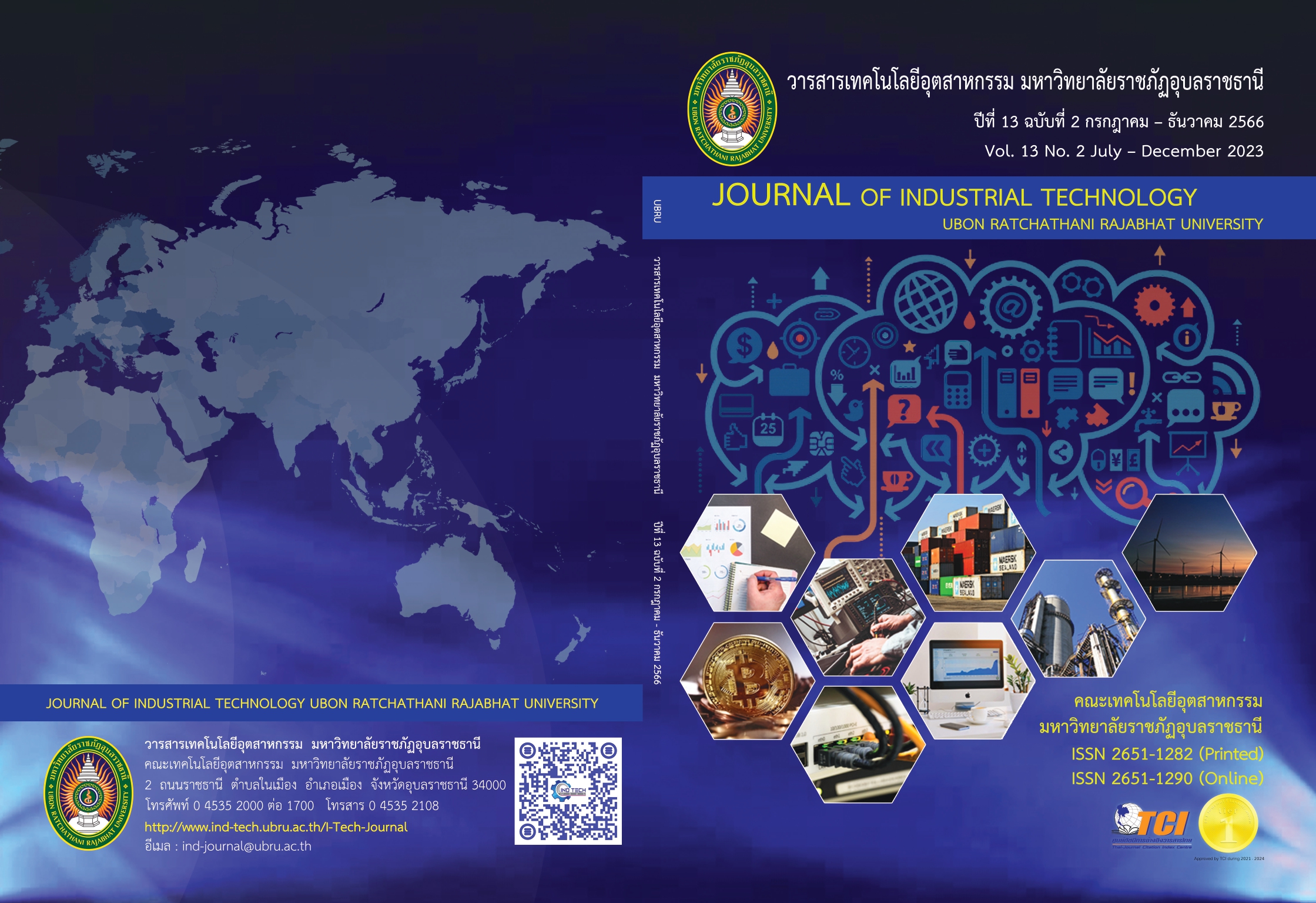ผลกระทบด้านกำลังอัดของจีโอพอลิเมอร์เพสต์และกำลังดัดของจีโอพอลิเมอร์มอร์ต้าร์ : กรณีศึกษา ใช้เถ้าลอยถ่านหินกับซิลิก้าฟูมเป็นส่วนผสม
Main Article Content
บทคัดย่อ
งานวิจัยนี้มีวัตถุประสงค์เพื่อศึกษาถึงผลกระทบของอัตราส่วนเถ้าลอยถ่านหินต่อซิลิก้าฟูม (FA : SiO2) ความเข้มข้นของโซเดียมไฮดรอกไซด์ (NaOH) อัตราส่วนของโซเดียมไฮดรอกไซด์ต่อโซเดียมซิลิเกต (NaOH : Na2OSiO2) โดยน้ำหนัก ต่อกำลังอัดของจีโอโพลิเมอร์เพสต์ และเพื่อศึกษาถึงผลกระทบของอัตราส่วนเถ้าลอยถ่านหินต่อซิลิก้าฟูม (FA : SiO2) โดยน้ำหนัก ต่อกำลังดัดของจีโอพอลิเมอร์มอร์ต้าร์ ผลการศึกษาของกำลังอัด พบว่า อัตราส่วนเถ้าลอยถ่านหินต่อซิลิก้าฟูม ร้อยละ 80 : 20 ให้กำลังอัดสูงที่สุด มีค่าเท่ากับ 91.32 กก/ซม2 โดยการใช้โซเดียมไฮดรอกไซด์ที่มีความเข้มข้นสูงขึ้นทำให้การพัฒนากำลังอัดดีขึ้น ผลการศึกษาของกำลังดัด พบว่า อัตราส่วนระหว่างเถ้าลอยถ่านหินกับซิลิก้าฟูมเท่ากับ 80 : 20 มีค่ากำลังดัดสูงสุดเท่ากับ 3.33 กก/ซม2 ผลงานวิจัยนี้สรุปได้ว่าสามารถทำคอนกรีตบล็อกเชิงตันไม่รับน้ำหนักตามมาตรฐาน มอก. 2895-2561 ได้จริง เพราะมาตรฐานดังกล่าวได้กำหนดให้คอนกรีตบล็อกเชิงตันไม่รับน้ำหนักต้องรับกำลังอัดไม่น้อยกว่า 40.61 กก/ซม2 ดังนั้น งานวิจัยขั้นต่อไปจะใช้อายุบ่มที่มากขึ้นหรือเปลี่ยนอัตราส่วนผสม เพื่อเป็นการเพิ่มประสิทธิภาพของงานวิจัยให้ดีขึ้นอย่างไรก็ตามกำลังอัดของจีโอโพลิเมอร์เพสต์และกำลังดัดของจีโอโพลิเมอร์มอร์ต้าร์ในงานวิจัยนี้ จะมีการศึกษาต่อเพื่อพัฒนาเป็นผลิตภัณฑ์คอนกรีตกำลังสูงต่อไป
Article Details

อนุญาตภายใต้เงื่อนไข Creative Commons Attribution-NonCommercial-NoDerivatives 4.0 International License.
บทความที่ได้รับการตีพิมพ์ในวารสารฯ ท้ังในรูปแบบของรูปเล่มและอิเล็กทรอนิกส์เป็นลิขสิทธิ์ของวารสารฯ
เอกสารอ้างอิง
Klabprasit T, Jaturapitakkul C, Chindaprasirt P, Songpiriyakij S. Fly Ash and Bio-mass Ash Based Geopolymer Pastes Part I: Effect of Mix Proportion on Compressive Strength. Engineering Journal of Research and Development. 2008; Vol. 19 No.2: 9-16. (in Thai)
Klabprasit T, Jaturapitakkul C, Chindaprasirt P, Songpiriyakij S. Fly Ash and Bio-mass Ash Based Geopolymer Pastes II: Relationship between Rate of Reaction and Compressive Strength. Engineering Journal of Research and Development. 2008; Vol. 19 No.2: 17-24. (in Thai)
Thai Industrial Standards Institute. TIS 2895-2561: Solid nonloadbearing concrete mansonry unit. Bangkok: Ministry of Industry; 2018. (in Thai)
Thai Industrial Standards Institute. TIS 433-2539: Liquid sodium silicates for industry. Bangkok: Ministry of Industry; 1996. (in Thai)
Thai Industrial Standards Institute. TIS 150-2549: Sodium Hydroxide for industry Uses. Bangkok: Ministry of Industry; 2006. (in Thai)
ASTM C109/C109M-99: Standard Test Method for Compressive Strength of Hydraulic Cement Mortars (Using 2-in. or [50 mm] Cube Specimens). Philadelphia: ASTM International; 2001.
ASTM C78/C78M: Standard Test Method for Flexural Strength of Concrete (Using Simple Beam with Third-Point Loading). Philadelphia: ASTM International; 2001.
Sukontasukkul P. Concrete. Pathum Thani: Wankawee Publisher; 2013. (in Thai)


